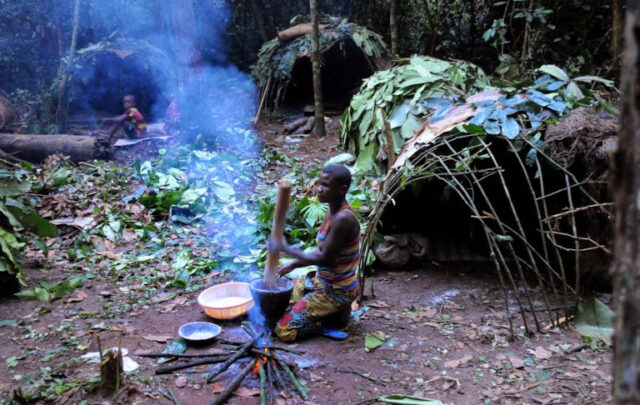 written by the editors of Living Green Magazine, September 5, 2012
written by the editors of Living Green Magazine, September 5, 2012
No doubt you’ve heard the great news: Globalization is going to save the world. Sure, things are (really) bad right now, but as more nations join the global economy, their economies will become more integrated, and their interests and goals will become more aligned.
As the economic playing field levels, perceived inequalities between ethnicities and belief systems will be ironed out. We’ll all work together to combat problems like global warming. And, ultimately, we’ll all be borne forward on a tide of economic prosperity until we reach the shores of a big, happy, peaceful, unified world.
It all sounds very progressive and promising, says contemporary issues writer Ellen LaConte. Too bad it’s just a collective pipe dream—and a very dangerous one. “The elephant in the room of our political dithering and partisan complaints is a global economy that’s too big not to fail.”
LaConte offers five indicators that the elephantine economy is about to go rogue and make localization a cutting-edge survival skill.
“While there have been some voices of dissent, they’ve been largely drowned out by the assurances of those getting rich from the global economy,” says LaConte, author of Life Rules: Nature’s Blueprint for Surviving Economic and Environmental Collapse. “The prevailing attitude seems to be that globalism is good—or will be as soon as the bugs get worked out.
“What most people can’t seem to grasp, or perhaps more accurately don’t want to believe, is that globalization not only ain’t all that, it’s the exact opposite of what we should be doing,” she adds. “It’s a system that’s doomed and for a simple reason: It goes against the laws of Life itself. Life evolved local and regional economies that couldn’t burn and churn through Earth’s finite supplies of resources. It put global economies that could out of business. Simply put, the global economy is too big NOT to fail.”
LaConte likens the global economy to an elephant: Its trainers (policy-makers and global leaders) think that they have the beast under their control. For awhile, the elephant did its masters’ heavy lifting and delivered them most of the goods. Now, though, it’s starting to go rogue—disobeying commands and acting unpredictably.
“Before long,” she warns, “the elephant will turn on its handlers. It’ll tear up our ‘global village,’ creating chaos, crushing crops, huts, innocent villagers, and other living things, while its masters dither with budgets, birth certificates, dead terrorists, and taxes.”
The scary truth is that the economic, environmental, social, and political crises we’re facing are red flags warning us that the system we’re all counting on is headed for collapse, says LaConte. Global leaders are approaching these crises as though they were distinct and unrelated, when in reality, the problem is globalization itself.
To those who still believe in “the myth of perpetual growth and universal prosperity,” LaConte offers a hard truth:
Life Rules—We Don’t
Economies of every kind and size are dependent on the largest economy—the largest supplier of goods and services—of which they are a part.
“For us—contrary to what you may assume—the largest economy is not the global monetary economy,” LaConte explains. “It’s the biosphere—Life itself. You see, Life manages Earth’s accounts sustainably, which is how it has managed to last for four billion years. The global economy does not manage Earth’s accounts sustainably. Under its influence we are living beyond Earth’s means.”
LaConte explains that if we continue to degrade and spend down Earth’s trust accounts of good soils, fresh water, and oceanic carbon sinks, for example, it doesn’t matter how much money is floating around in the econosphere or who has it. We can’t restore depleted resources and degraded natural systems overnight the way the Fed can print more money or raise a debt ceiling. That’s why LaConte’s bottom line is that “life rules; we don’t.”
“Once our global economy has exhausted the natural resources and ecosystem services that are our true and common wealth, it can’t get any bigger,” she says. “We’re almost to that tipping point now. And the leaders and systems that have caused and perpetuated this crisis can’t and won’t solve it for us. Like Einstein said, you can’t solve a problem with the same kind of consciousness—the same worldview—that created it. The blind can’t lead the blind out of this mess.”
So what should Americans do before the global economy stops delivering the goods reliably or at all? LaConte suggests we learn from the most successful economic system on the planet.
“Life teaches us how long-lasting, sustainable economies work,” she says. “These economies are local, not global. Think about it this way: The Earth doesn’t have one ecosystem or climate, but many as different from each other as oranges are from apples. Diversity is the way Life guaranteed some living things and systems would have the skills to survive almost any cataclysm. This means that we can diversify. We can relocalize or, in more realistic terms, re-regionalize economically, fit ourselves into these smart living systems and work with them. To do that, we need to figure out what natural and human resources we still have to work with closer to home and how to use them sustainably to provide the necessities and maybe some niceties for ourselves and each other.”
The End of Cheap-Easy
What makes LaConte think now’s the time to relocalize? The increasing number of resources essential to our present way of living that were once cheap and abundant—what she calls “cheap-easy”—but no longer are. She cites five:
1) Oil and other fossil fuels. We’re quickly depleting the worldwide supply of oil, and there are no new cheap-easy fields. We don’t want to admit it, but abundant, inexpensive oil is history. What difference does that make? For one thing, there’s no replacement that can do all that oil has done as cheaply and universally as oil has done it.
“Nearly all the goods and services the global economy provides are in one way or another oil-dependent,” LaConte points out. “When oil’s too expensive or gone, so are they. Plus, energy analysts predict that we can add to the end of cheap-easy oil the imminent end to cheap-easy coal and natural gas. And if there are no cheap-easy fossil fuels, there is no global economy.”
2) Good weather. Only dyed-in-the-wool deniers still believe the climate isn’t changing. The world is becoming warmer overall, but the weather is also more unpredictable and violent. Cheap-easy weather is on the way out.
“The familiar species and ecosystems with which humans have cohabited for time immemorial are caput if the familiar, congenial climate is no more,” promises LaConte. “Already, weather-related emergencies and disasters, crop and business losses, and species and human migrations alone have made the world’s new weather costly in lives and money. Plus, these events have served to further destabilize the economy.”
3) Water. Frighteningly, worldwide demand for water will exceed supply by 50 percent as soon as 2025. Water-intensive globalized agri-business and livestock operations, global industrialization and pollution, growing population, and wasteful distribution processes have contributed to the shortfall in freshwater supplies around the world.
“With rising prices and rationing, we’ll soon be saying ‘so long’ to cheap-easy water,” LaConte predicts.
4) Food. It doesn’t take a rocket scientist to figure out that the end of cheap-easy oil, water, and weather signals the end of cheap-easy food. Arable land is already at a premium everywhere in the world, and what there is of it is being depleted and degraded by fossil-fueled farming techniques.
“Of the world’s seven billion people,” points out LaConte, “a third are well fed, at least for now, a third are underfed, and a third—a couple billion people!—hover between malnutrition and starvation. If we’re not careful, that number will only grow.”
5) Prosperity. Unless you’ve been living under a rock, you know what a roller coaster ride the global economy has taken most Americans on. You’ve probably felt the recession’s effects yourself.
“No matter what they promise, politicians can’t conjure prosperity out of thin air,” LaConte says. “And in an economy facing this many pending scarcities, the goods and services on which it makes its money will be adversely affected. Credit, cash, capital—the keys to conventional definitions of prosperity—will, like the other items in this list, cease to be either cheap or easy to get.”
No Global? Go Local
Thoughts of bringing economies closer to home flourish whenever a prevailing economy fails to deliver the goods people expect from it, or when it seems to deliver more harm than good. And unless you’re among the top 10 percent of Americans, you’re already experiencing some of that harm.
“Though the drift toward globalization is 400 years old, the fully globalized economy is only about 60 years old,” LaConte points out. “Meanwhile, we modern humans have been innovating solutions to the challenge of providing for ourselves for 100,000 years. Surely we can relearn how to live without globalization, and go back to more localized economies.
“The teachings, teachers, tools, and techniques for doing this already exist,” she adds. “All we need is the will. Relocalization is the way.”
The book Life Rules: Nature’s Blueprint for Surviving Economic and Environmental Collapse is available from New Society Publishers, at local bookstores and online. For more information, visit www.ellenlaconte.com






